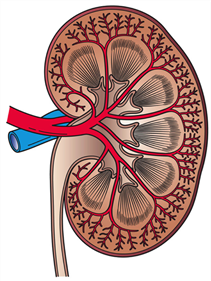
Patients with advanced kidney cancer who received a new combination treatment reported health-related quality of life outcomes that were either similar or improved, compared to patients who received standard first-line therapy, according to a study published in The Lancet Oncology.
The findings underscore the potential for the new treatment combination in improving patients’ course of treatment and extending survival, said David Cella, Ph.D., the Ralph Seal Paffenbarger Professor and chair of the Department of Medical Social Sciences, and senior author of the study.
“Effective treatment options have never been better for this disease and yet more progress is needed. Patients’ reports of how they are feeling and functioning is certainly meaningful to them, and also can help clinicians when guiding continued quality care,” said Cella, who is also director of the Center for Patient-Centered Outcomes, part of the Institute for Public Health and Medicine (IPHAM), and a member of the Robert H. Lurie Comprehensive Cancer Center of Northwestern University.
Advanced kidney cancer occurs when cancer cells inhibit the inner lining of kidney tubules, which help filter and clean the blood. Over the last 20 years, treatments for the disease have improved, transitioning from biologic response-modifying drugs to more targeted therapies such as tyrosine kinase inhibitors and mTOR inhibitors.
More recently, the addition of immunotherapy treatments, which are often combined with tyrosine kinase inhibitors, have further improved patient quality of life and survival.
Results from the phase III CLEAR study—an open-label, randomized trial conducted across 200 hospitals and cancer centers in 20 different countries—demonstrated that patients with advanced kidney cancer who were given a tyrosine kinase inhibitor (lenvatinib) plus immunotherapy (pembrolizumab) demonstrated improved progression-free survival and overall survival compared with patients who received a tyrosine kinase inhibitor (sunitinib) alone.
In the current study, Cella and his team assessed health-related quality of life outcomes (HRQOL) scores from the phase III CLEAR study patients. These scores comprised patient-reported disease symptoms, side effects from treatment, and aspects of everyday functioning and general perceptions of life quality and enjoyment.
Overall, the investigators found that patients given lenvatinib plus pembrolizumab treatment had similar or favorable HRQOL scores compared to patients given sunitinib alone. The findings suggest that the combination treatment may be a promising first-line therapy for advanced kidney cancer, according to the authors.
Source: Read Full Article
